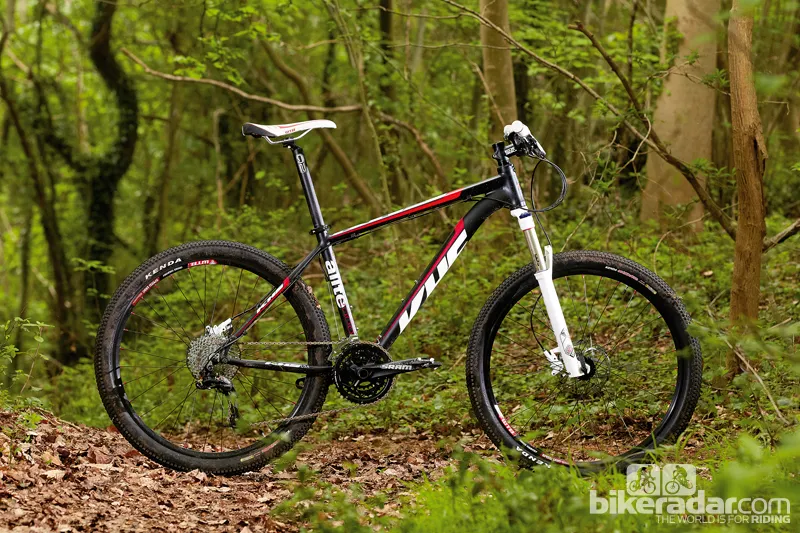If you’re looking to hit the sub £1,000 mountain bike market this is one of the pricier options out there. But we suspect most enthusiast trail riders will be happy to pay the premium to get an 11.6kg (25.5lb) bike with a RockShox Reba fork.
The fact that it has light wheels and fast tyres will boost its appeal to anyone who values floaty cross-country speed, but the 120mm (4.7in) of fork travel means it’s not averse to taking a few dodgy lines on the fast technical stuff.
For those who aren’t aware, KHS are an established (since 1974) US brand, and they have a small distribution outlet in the UK.
Ride & handling: Full of beans for more experienced riders
The Alite’s lively handling and fast tyres are bound to appeal to riders in search of pure speed, but Kenda’s Small Block Eight treads revealed their traction weaknesses in the generally muddy conditions of the test period.
Its lively handling does take a while to get used to for those who are not accustomed to jumping on and off lots of different bikes too.
The essence of the KHS is that it will appeal to competitive riders more than the relatively relaxed rides offered by other similarly priced bikes. The light steering demands more attention over rough terrain and steep, rocky, rooty drops, but climbing prowess is superb apart from when the treads block.
Frame & equipment: Nice touches, with RockShox Reba a standout feature
The KHS frame tubes are mainly joined with silky smooth double-pass welds.
Combined with the flared, tapered hydroformed contours of the top and down tubes and curvy seatstays that help take the sting out of the back end, this results in a classy looking frame that’s very deserving of its high performance, lightweight selection of componentry.
A 70-degree head angle is fairly steep for a bike with a 120mm travel fork, and this might not suit those whose ride bias sways towards steep downhills. But it adds to the lively character of the overall package, a character that’s stressed by a lack of rack mounts and generous reach from the saddle to the handlebar.
We’ve seen a few £900 bikes with a RockShox Reba fork, but not many. This is a fork that could cost you £400 or more and it’s a real performance booster on a bike like this. The 120mm of travel can be adjusted down to 100mm, but we liked it just as it came.
The action is plush, well controlled and adjustable via positive and negative air springs (it’s the right balance of the two springs that makes for such a well controlled compression and rebound action on the Reba) plus a rebound damping adjustment knob at the base of the right hand leg.
A leg top compression damping lever creates a ‘lockout’ that still leaves a small amount of compression.
KHS use a canny mix of SRAM’s 3x10 X5 and X9 drivetrain parts. A 36-tooth biggest cassette sprocket caters for bail-out gear moments on steep climbs at the end of long rides, while a 44-tooth biggest chainring allows you to wind up to high speeds on the descents.
Shifting remained precise throughout the test period, as did braking via low budget but powerful Avid Elixir 1s. WTB Speed Disc XC rimmed wheels, with fast-rolling Kenda Small Block Eight tyres, are very light, but the alu spoke nipples were a mixed blessing – they trim a little weight, but can round off easily when you try to true a wheel.
The other finishing parts were all decent quality offerings – the 27in low rise bar and four-bolt stem are from Kore, the seatpost is a twin-bolted model and the saddle is one of our favourites, a WTB Volt. Bolt-on grips complete the package.

This article was originally published in Mountain Biking UK magazine, available on Apple Newsstand and Zinio.
